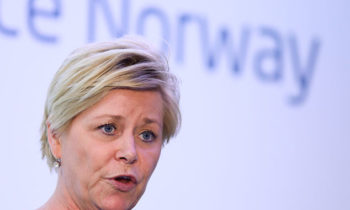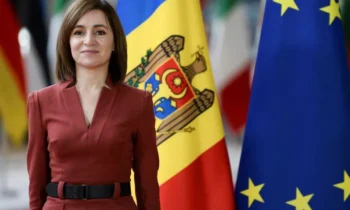 There has been a lot of talk about the “Norway solution” for Britain after Brexit over the last two years, but little about what the Norwegians themselves think about the arrangement they have with the European Union.
There has been a lot of talk about the “Norway solution” for Britain after Brexit over the last two years, but little about what the Norwegians themselves think about the arrangement they have with the European Union.
However, a few days ago I was fortunate to attend a talk by Siv Jensen, Norway’s finance minister, on bank regulation at the think tank Policy Exchange in London. As well as being the third most powerful person in Norway, she’s also leader of the pro-market Progress Party. This means that she’s much more sceptical of the idea that regulation can solve every problem. She’s also sympathetic to the British concern that too much red tape can make things worse. I was also lucky enough to grab a few words with her after she finished.
One of the main worries about the European Economic Area (EEA) option, which comes up time and again, is that being part of the single market requires full compliance with the relevant European rules, limiting our freedom to set out our own regulation (see last week’s interview).
However, Jensen points out, both in her speech and afterwards, that an increasing amount of financial regulation is carried out at the global level. This process has intensified in the last decade with the G20, International Monetary Fund, and other global bodies developing “a set of common international standards and rules for the regulation and supervision of the financial sector”.
The principles underlying these rules have been codified in the Basel Accords. The first set of these rules was produced 30 years ago, with the latest version appearing in 2013. Most of the world’s financial centres, including both the United States and the EU, have incorporated Basel, or something similar, into their legislation. This means that it would be “in our interest” for us to follow these rules. The obvious (though unspoken) implication of this is that there is no getting away from the fact that whatever we do, we would still be a “rule-taker” to a certain degree.
In any case, while its EEA status means that Norway doesn’t have a direct vote on European policies, Jensen notes that it still has the ability to influence decisions, both before and after Brussels comes up with directives. Indeed, she and her government have found the EU to be “flexible and willing to listen” to any concerns that Norway might have. Norway is also able to informally shape regulation by its participation in several meeting places and forums designed to allow Nordic and Baltic regulators to effectively supervise institutions that operate across the region.
More generally, Jensen thinks that the EEA agreement “has served our country well” giving Norwegian companies frictionless access to its largest trading partner. While some politicians talk about Norway becoming a full member of the EU, and others want to move to a looser free-trade agreement, she thinks that the status quo is supported by a “broad majority” of the population, “who understand its benefits”. While the government will continue to push Norway’s interests, she predicts that in ten years time, it will still be an EEA member and its relationship with the rest of Europe will be broadly unchanged.
Despite being in the single market, Norway is outside the EU’s customs union. This means that there are some border controls between it and neighbouring Sweden. Jensen thinks that this is not a major problem for businesses on either side of the border, as the two countries have been able to cooperate well. On the issue of free movement, she has previously stated that Europe’s rules have made it too easy for migrants to gain access to some benefits, such as child benefit for non-resident children. However, she now thinks that opinion within Europe is starting to shift on this specific issue, if not on the wider principle.
Overall, Brexit “isn’t something that is frequently discussed by the average Norwegian”, she admits. However, like most Norwegian officials and politicians, Jensen is keeping a close eye on developments, not least because it will affect Norway’s own relationship with the UK. She refused to be drawn on how the Norwegian government would respond if Theresa May changed her mind and applied to be part of the EEA, emphasising that she can’t answer such a hypothetical question – before adding, “we always take the UK seriously on every question”.
(moneyweek)



